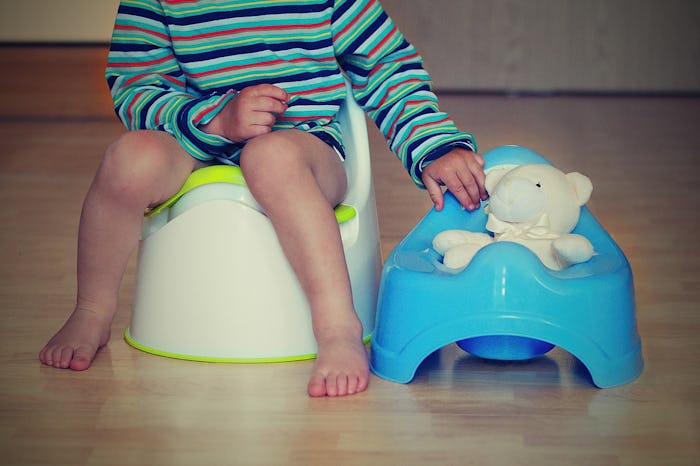Life

How To Deal With Potty Training Regressions, According To An Expert
Potty training is never fun or easy, but when it came to teaching my daughter to use the bathroom I have to admit that it wasn't too bad. Like, it was a nightmare, but in this case it wasn't a long nightmare — after three long days she was out of diapers. But then, after about a year of absolutely no accidents, something weird happened: she started wetting her pants. And that's when I started franticly Googling "how to deal with potty training regressions," because going backwards in this process was not something I anticipated.
Before learning how to deal with a regression, it's important to know what a potty training regression actually is. A regression isn't an isolated incident in a potty trained child (accidents happen!) or setbacks when a child is still in the process of learning (even if they'd had a winning streak and you thought you were out of the woods). A potty training "regression" describes a child suddenly not using the toilet after having been trained for a considerable period of time.
In my case, my daughter was a true bladder control savant for a year before her regression occurred. She hadn't had so much as a nighttime accident when she suddenly started peeing on any playground we chanced upon. (Because of course this had to happen in public, right?) Her experience is a great example of a regression — a seemingly out of nowhere, giant step backwards when we thought we had put the whole potty training thing behind us.
"Most of the time regressions are brought on by some kind of emotional stress ... [or] some kind of change in your child's life," Allison Jandu, a potty training expert, tells Romper via phone. "These can be big issues, like divorce, a death in the family, a friend moving away, or a classroom transfer at school." Other times, Jandu says, the cause can be something that's ultimately minor but is nevertheless significant to the child. "Sometimes it's so small that a family never figures out what caused [the regression]."
Jandu suggests that when you are aware of a big change or upheaval, try talking about it and your child's feelings on the subject beforehand. An open line of early communication could help prevent the regression from happening in the first place.
If you find this happening to you and your child, rest assured that this is a normal, probably a reaction to some change or source of stress, and is fixable.
If, however, you find yourself unexpectedly in the thick of an unwelcome sh*tstorm (literally), have no fear. Because whether or not you can guess the root of what has caused your child to suddenly slip back won't ultimately change your next steps. The prescription is the same: talk to your child about their feelings. If you know what they're currently going through, give them space to address the issue. If you don't know what's wrong, know that they may not be able to pinpoint what's wrong either (at least not on a conscious level), and the two of you will spend some time figuring it out together.
In the end, talking about your child's feelings can help them put their regression behind them.
Jandu says that regressions often will resolve on their own — a fact I know first hand, as my daughter's regression kind of took care of itself (thankfully). Other, more severe instances, will require some parental help in "retraining." If you find this happening to you and your child, rest assured that this is a normal, probably a reaction to some change or source of stress, and is fixable.
After all, you potty trained them once. You can do anything! You've got this!